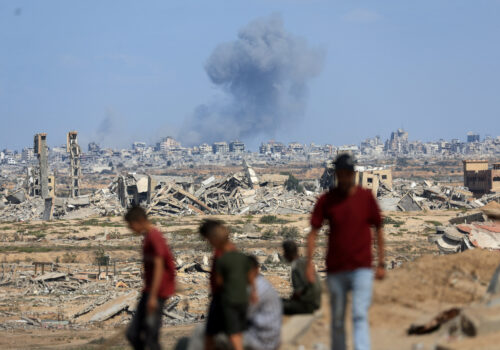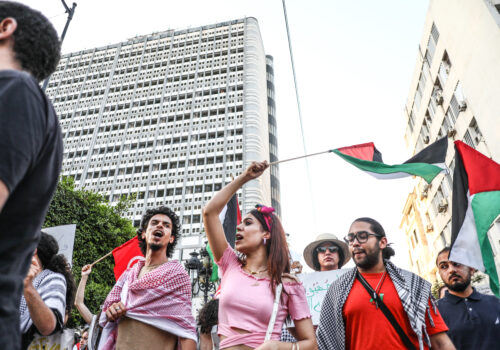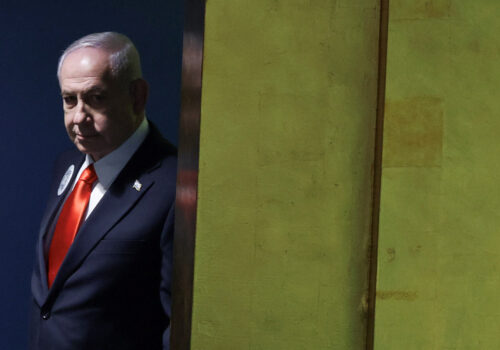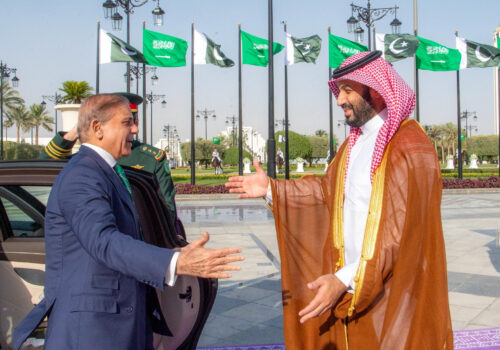Amid Gaza cease-fire hope, where does the Egypt-Israel relationship stand?
In his speech at the emergency Doha summit last month in response to Israel’s airstrikes targeting Hamas officials in Qatar, Egyptian President Abdel Fattah el-Sisi for the first time labelled Israel an “enemy.”
He also condemned the attack on Doha as “reckless” and “in grave violation of international law” and warned the Israeli people that Prime Minister Benjamin Netanyahu’s government was “endangering the peace agreement with Egypt” and “making further normalization with countries in the region impossible.”
But apart from the fiery rhetoric, the summit of Arab and Muslim leaders stopped short of threatening Israel with retaliatory measures. That said, Israel’s Doha strike has nonetheless shifted the dynamics in relations between Jerusalem and Cairo—likely stemming from concerns that Egypt may be next for Israeli crosshairs.
Despite the harsh exchange of accusations and increased hostility toward Israel, the peace treaty cited by el-Sisi—reached in 1979—remains intact.
Some analysts like Emad Gad, deputy director of al-Ahram Center for Strategic Studies, argue that the Egyptian leadership is neither ready nor willing to jeopardize the peace treaty or widen the rift with Israel.
“Security cooperation between Egypt and Israel remains strong and Egypt is one of the parties involved in negotiations to reach a diplomatic solution to the Gaza crisis,” he told me.
The Gaza war has generally strained Israel-Egypt relations—especially since Israel’s seizure of the Philadelphi Corridor in May 2024, with the declared intent of destroying underground tunnels, Jerusalem claims, which were used by Hamas to smuggle weapons into Gaza.
Yet, Gad remains hopeful that the Gaza crisis will be resolved through diplomatic channels—a step that he said “would subsequently defuse tensions between Egypt and Israel and restore relations to where they were before the Gaza war.”
And there are further signs of a breakthrough, including the announcement this week that phase one of a Gaza cease-fire deal had been achieved after negotiations in Egypt.
“This means there will be no more talk of relocating the Palestinians—the issue causing the tensions with Egypt,” Major General Samir Farag, senior strategist at the Security and Defense Advisory Board of Egypt, told me.
Related Reading
The Egypt-Israeli peace treaty
The 1979 peace treaty originally allowed only 450 security personnel with light weapons to be stationed in Area C (the closest area to the Israeli border) of northern Sinai, but was modified after Israel’s withdrawal from Gaza in 2005 to allow for an additional 350 soldiers to be deployed. In 2018, Israel gave Egypt the green light to double the number of troops in North Sinai to support the Egyptian army and security forces in their counter-insurgency against Islamic State of Iraq and al-Sham (ISIS)-affiliated Jihadists. Israel’s goodwill gesture prompted a warming of ties and enhanced security cooperation between Egypt and Israel.
SIGN UP FOR THIS WEEK IN THE MIDEAST NEWSLETTER
But concerns are now mounting in Cairo after Netanyahu defiantly vowed to”hunt Hamas everywhere.” Addressing a joint press conference with US Secretary of State Marc Rubio in Jerusalem in mid-September, Netanyahu warned Hamas that its leaders and members “have no immunity anywhere,” insisting that “Israel has a right to defend itself beyond its borders.” The chilling warning heightened fears in Cairo of a similar Israeli attack targeting Hamas inside Egypt; as mediator in peace negotiations between Israel and Hamas alongside Qatar and the United States, Cairo often hosts senior leaders of the Palestinian Islamist group.
Cairo has met Netanyahu’s threat with equal defiance; the Egyptian leadership reportedly warned Washington of “devastating consequences” if Hamas leaders were targeted inside Egypt. A senior Egyptian security official speaking on background vowed to the London-based Middle East Eye that any such attack would be considered a declaration of war and would be “met with force.”
Gad did not altogether rule out the possibility of war breaking out and urged Israel not to push Egypt to the brink.
“Egypt would likely retaliate to any attack by Israeli forces on its territory,” he cautioned, adding that any attempt by Israel to forcibly displace the Palestinians into North Sinai “could spell the demise of the peace treaty.”
Concerns of military buildup
Another bone of contention between Cairo and Jerusalem is Israel’s claim of an Egyptian military build-up in the northern part of the Sinai Peninsula near its shared border with Israel and the Egypt-Gaza border. In a meeting with the Supreme Council of the Armed Forces on October 5 to discuss border security, el-Sisi urged the arm to remain on high alert—Cairo is likely worried about a potential mass exodus of Palestinians into Egypt.
The alleged Egyptian military build-up has caused concern in Israel, according to media reports in outlets like WION Pulse and Middle East Eye. Meanwhile, Yechiel Leiter, the Israeli ambassador to the United States, has accused Egypt of “a very serious violation” of its peace treaty with Israel, citing the building of bases which “can only be used for offensive operations.” Netanyahu has also asked the Trump administration to press Egypt to scale down its military presence in the Sinai Peninsula, according to a recent Axios report quoting anonymous Israeli officials.
Hossam Hamalawy, an Egyptian researcher and journalist who publishes a weekly online newsletter focusing on Egyptian security and politics, meanwhile dismissed the allegations of Egyptian military build-up as “fake news.”
“There can be no troop deployment in the Sinai without prior coordination with Israel,” he told me.
Hamalawy also insists, “it is business as usual between Egypt and Israel,” citing an unprecedented $35 billion agreement signed by Israel’s Leviathan natural gas field in August to supply natural gas to Egypt.
“If Egypt and Israel are cementing their energy ties, relations between them can’t be as tense as some media would have us believe,” Hamalawy argues.
A security source who spoke to me on condition of anonymity said that the continued presence of Israeli forces in the formerly demilitarized buffer zone stretching fourteen kilometers along the Gaza-Egypt border—despite Cairo’s repeated demands that Israel withdraw from the strategic corridor—has also put a heavy strain on relations between Egypt and Israel and suggested it was another reason for the beefing up of Egyptian troops in north Sinai.
The legacy of the war in Gaza
Following its Doha strike last month, Israel intensified its attacks on Gaza City in mid-September, forcing thousands of displaced Palestinian families to move south close to the Egyptian border. The escalation has fueled fears in Egypt that Israel was seeking to “clean out Gaza (as suggested by US President Donald Trump in January) by forcibly displacing hundreds of thousands of Palestinians and relocating them in the Sinai Peninsula—a plan categorically rejected by Cairo. El-Sisi has, on several occasions, voiced his opposition to the plan, arguing that the displacement of Palestinians “would liquidate the Palestinian cause.” Egyptian officials and state-controlled media have slammed the idea of relocating Palestinians in the Sinai as “an existential threat.”
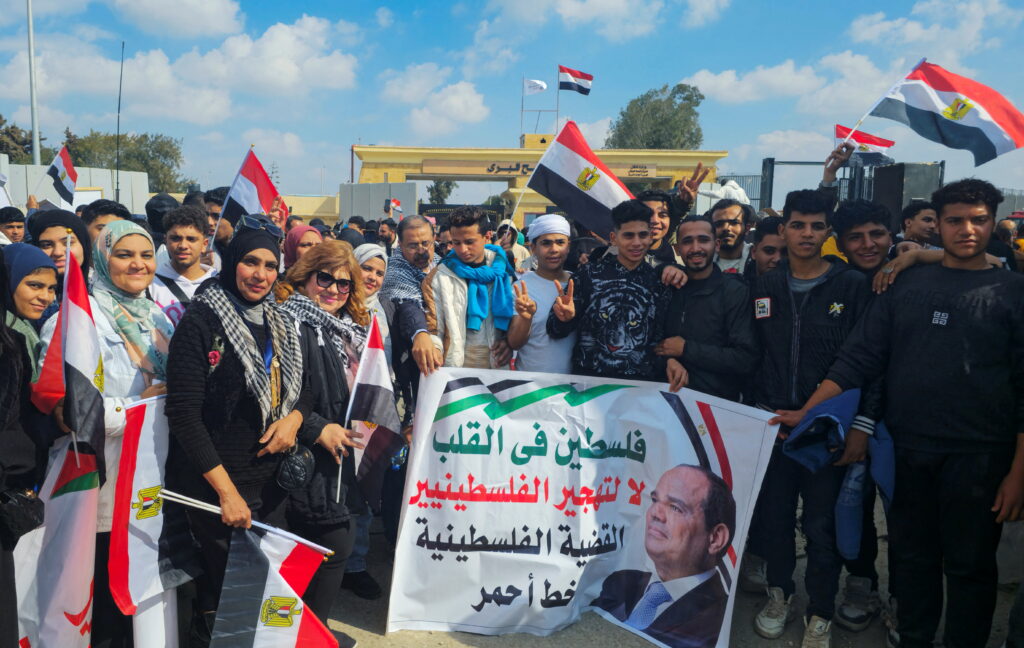
Despite Cairo’s strong condemnation of Israel’s Doha strike, the Egyptian leadership has so far avoided escalation into military confrontation or a complete rupture in diplomatic ties. This reflects Egypt’s strategic interests: border security, preventing a spill-over of the war into Egypt, and economic interests. Meanwhile, Egypt continues to engage in mediation between Israel and Hamas and is using the outcome of the Doha summit to boost its regional influence. Cairo is also using Israel’s Doha strikes to prop up its image at home, where public sentiment and opinion are largely pro-Palestinian.
On the other hand, the Doha strike was a strategic miscalculation for Israel as it has weakened trust with new Arab allies that have normalized relations with Israel, such as the United Arab Emirates. Other states that have yet to normalize, like Saudi Arabia, will likely re-evaluate the costs of such a move. Criticism of Netanyahu’s policies—both at home and abroad—has grown louder; pro-Palestinian rallies have gained strength and are winning new converts. International media and public opinion are increasingly challenging Israel’s narrative of acting in self-defense. By acting unilaterally, Jerusalem has already reversed some of the political and diplomatic gains it has made over the years.
If it does not change course, it risks moving into even deeper regional isolation.
Shahira Amin is a nonresident senior fellow at the Atlantic Council’s Scowcroft Middle East Security Initiative, focusing on Egypt, economics, energy, water access, and women’s issues.
Further reading
Fri, Jun 20, 2025
Inside Cairo’s ‘security first’ calculus on the March to Gaza
MENASource By Shahira Amin
Egypt's deterrence of the march are baffling to many, because the international initiative is in line with Egypt's declared position on Gaza.
Fri, Sep 26, 2025
For an increasingly isolated Netanyahu, it’s money time with Trump
MENASource By Shalom Lipner
Amid growing international criticism, the Israeli Prime Minister is playing his ace—or rather, his Trump—card in Washington.
Fri, Sep 26, 2025
The Saudi-Pakistan defense pact highlights the Gulf’s evolving strategic calculus
MENASource By
In Riyadh’s multi-aligned policy, signing a mutual defense deal with Pakistan is complementary, not alternative, to US security guarantees.
Image: Egyptian President Abdel Fattah el-Sisi participates in the emergency Arab-Islamic summit held in Doha Egyptian President Abdel Fattah el-Sisi participates in the emergency Arab-Islamic summit held in Doha, Qatar, on September 15, 2025. Photo by Egyptian President Office apaimages Qatar Qatar Qatar 150925_Qatar_EPO_001 Copyright: xapaimagesxEgyptianxPresidentxOfficexxapaimagesxNo Use Switzerland. No Use Germany. No Use Japan. No Use Austria
